Iran Official Says Recent Protests Posed 'Serious Security Challenge'
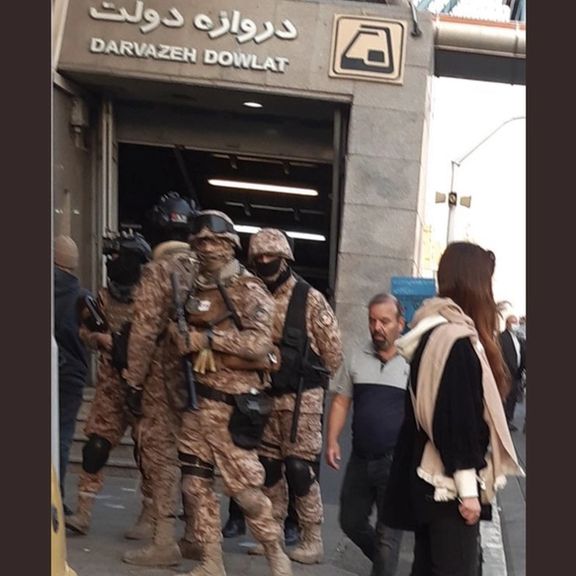
An aide to Iran’s President Ebrahim Raisi says that recent protests “instigated by enemies” posed a “serious security challenge” to the Islamic Republic regime.

An aide to Iran’s President Ebrahim Raisi says that recent protests “instigated by enemies” posed a “serious security challenge” to the Islamic Republic regime.
Mohammad Dehghan, the president’s legal aide was quoted by Fars news website Friday as saying that the “enemy succeeded” to instigate the “unprecedented” protests” carried out “by some elements who sold themselves out and some who were deceived.”
The Islamic Republic uses the term “enemy” to refer to the United States and its European and regional allies.”
As early as October, Supreme Leader Ali Khamenei blamed enemies for the protests that began in mid-September when Mahsa Amini, a 22-year-old woman who received fatal brain injuries in ‘hijab police’ custody and died in hospital.
Immediately, young people and especially women began protests across the country against the Islamic regime’s mandatory hijab and other restrictions and demanded an end to religious rule.
After Khamenei blamed the protest movement on foreigners, other senior officials began making the same claim and tried to accuse detained protesters of links with foreign countries.
Raisi’s aide also claimed that tens of security forces killed during protests “were unarmed,” while thousands of videos and photos show how they used all sorts of weapons, including shotguns, pistols and even assault rifles to shoot protesters. Over 500 civilians have been killed and hundreds injured, with scores losing one or both eyes.
The United States and its European allies have strongly condemned Tehran for the violent suppression of the protests and imposed multiple sanctions on Islamic Republic officials and entities.
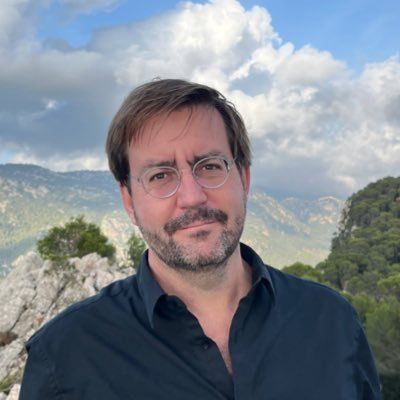
As scores of journalists have been arrested during the protests in Iran, Reporters Without Borders (RSF) announced that the Islamic Republic is determined to block all information channels.
Referring to detention of journalists in Iran, the RSF Executive Director Christian Mihr said Wednesday "It is important that the world learns about the brutality of the Iranian regime."
He said despite the arrests and threats to journalists in Iran, they "bravely continue to do their work."
According to the organization, since uprising against the regime in Iran, at least 55 journalists, including 16 female ones, have been arrested, and 27 of them are still behind bars.
The RSF further went on to say that 28 others were set free with large bails, but heavy prison sentences have been issued for a number of journalists.
Since the beginning of 2023, eight journalists have been arrested and four of them have been temporarily released on bail.
The Committee to Follow up on Situation of Arrested Journalists has prepared a list of these people saying at least 24 journalists are still under arrest.
Elaheh Mohammadi and Niloufar Hamedi, who published the news about the death of Mahsa Amini in police custody for the first time, are among the ones behind bars.
After their arrest, the Intelligence Organization of the Revolutionary Guard and the Ministry of Intelligence issued a joint statement accusing the two of espionage.
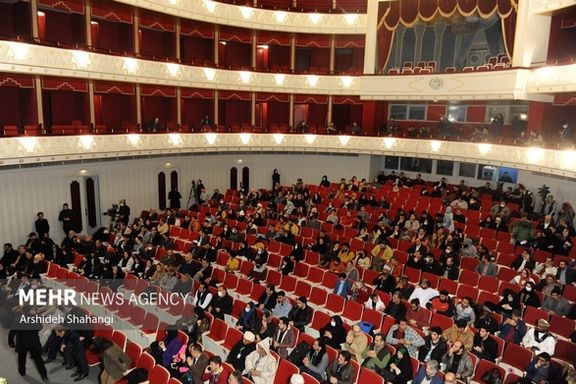
Iran’s Fajr Film Festival, the Islamic Republic’s biggest, has been snubbed by moviemakers and moviegoers amid ongoing protests all over the country.
The film festival is part of a series of events to mark the 44th anniversary of the Islamic Revolution marked by 10 days of state-sponsored ceremonies dubbed the decade of Fajr – which literally means dawn.
The trio of festivals – along with a theater and a music festival – have faced boycotts by numerous artists and art enthusiasts in recent years, but the current wave of protests and the regime’s heavy-handed crackdown seems like the coup de grâce to the most significant propaganda gala of the Islamic Republic.
Despite the government’s efforts to portray the events as popular as they used to be a decade ago, the theater festival was inaugurated in the sparsely attended Vahdat Hall this week.
It is ironic that even the most “prestigious” cultural events of the Islamic Republic are held in halls constructed prior to 1979 in the era of monarchy, as the clerical regime never truly invested in culture, and considers most of its representations un-Islamic except for a couple of weeks during the celebrations for the establishment of the Islamic Republic.
Even though photos of the empty hall during the theater festival’s opening ceremony were reported even by state media and outlets affiliated with the Revolutionary Guards, Mohammad Mehdi Esmaili, the Culture and Islamic Guidance minister, said that the event was welcomed by the people.
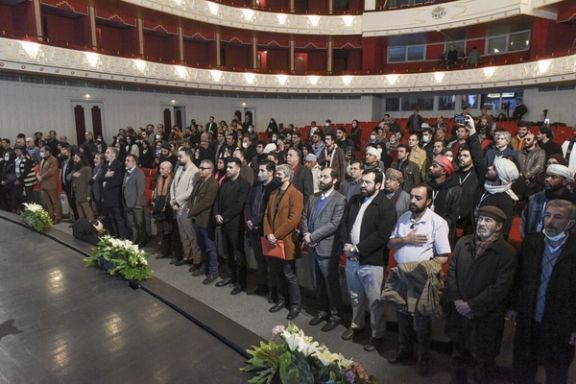
Since the beginning of the ongoing uprising in mid-September, many celebrities were banned, arrested or summoned by the judiciary for their solidarity with the current movement. Some of the most popular actors and artists even emigrated from the country to be able to express their support for the antigovernment protests freely and without fear of arrest.
Many actors and filmmakers had announced their boycott of the festival weeks before the start of the event, prompting the authorities not to announce the films selected to be screened during. Something unprecedented that took place this year was that the tickets for the movies were sold without the names of the works, because the government feared that if it announced the flicks, more artists would announce their opposition to the event. Of course, their trick turned out to be ineffective as some actors actually announced their boycott after their films were selected for screening, such as Haniyeh Tavassoli. Most of the actors, actresses and even directors do not have a say in the screening their movies because almost all of the productions in Iran are sponsored by state organizations.
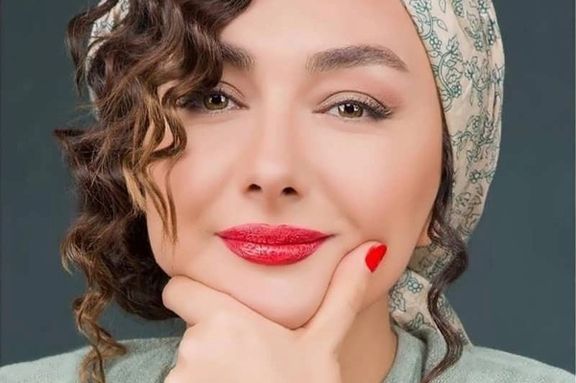
The festival had always been dominated by the works produced by government organizations and propaganda institutes but this year the level of audacity of the regime is even higher as authorities have announced that no movies that draw a grim portrait of the society were selected for screening. The committee tasked with selecting the movies is comprised of regime insiders, some of whom were not even film industry figures, such as Reza Pourhossein, a cultural manager and a professor of psychology at the University of Tehran.
The secretaries of the festivals and their juries are also selected from the figures close to the regime and known for works that promote regime propaganda, such as the secretary of the film festival Mojtaba Amini, a producer who was involved in the attacks on the Saudi embassy when it was ransacked by IRGC’s basij militias in January 2016. The secretary of the Theater festival called those who boycott the event “cultural dictators” at the opening ceremony.
The antigovernment protests, coupled with economic woes and political uncertainty, have clouded the cultural landscape of the country so much that the culture minister was reported asking theater directors and singers to start holding performances so that the regime can pretend the situation is back to normal.
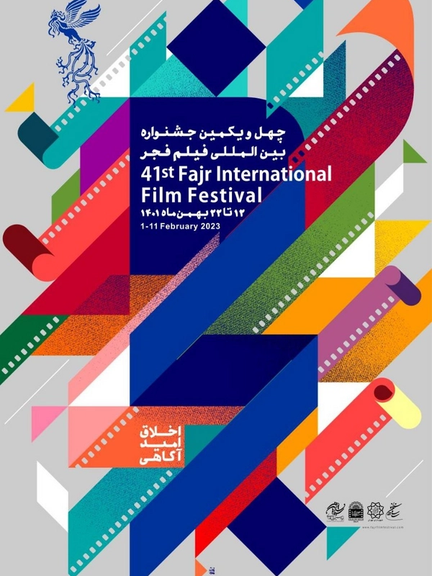
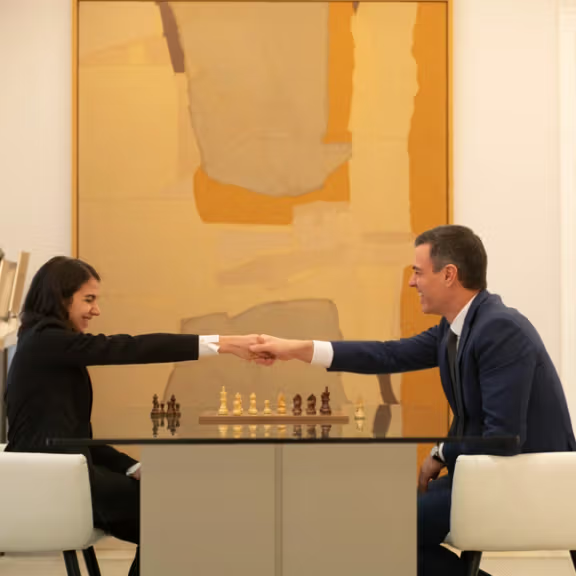
An Iranian chess player, who defected to Spain after she competed without hijab, has met with Spanish Prime Minister Pedro Sanchez in Madrid.
Sarasadat Khademalsharieh arrived in Spain in early January after having made a bold statement in Kazakhstan's capital Almaty, where she had participated in the FIDE World Rapid and Blitz Chess Championships without wearing the compulsory hijab.
"How much I have learned today from a woman who inspires me," Sanchez posted on his Twitter account after hosting Khadem at his official residence Wednesday.
"All my support to women athletes. Your example contributes to a better world," he added.
In footage provided by the prime minister's office, Khadem is seen chatting with Sanchez without wearing a hijab. They later appear to engage in a game of chess.
In the past four years, dozens of Iranian athletes have defected to other countries in objection to Islamic Republic’s restrictive policies, including compulsory hijab for women during matches and a ban on competing against Israeli athletes.
Anti-regime protests against clerical rulers have been going on for more than four months when a 22-year-old Kurdish woman, Mahsa Amini, was killed in police custody for wearing "inappropriate attire".
The US-based Human Rights Activists News Agency (HRANA), one of the groups that monitors and publishes daily statistics about the protests, said Tuesday that 525 protesters have been killed from September 17 to January 23, including 71 children.
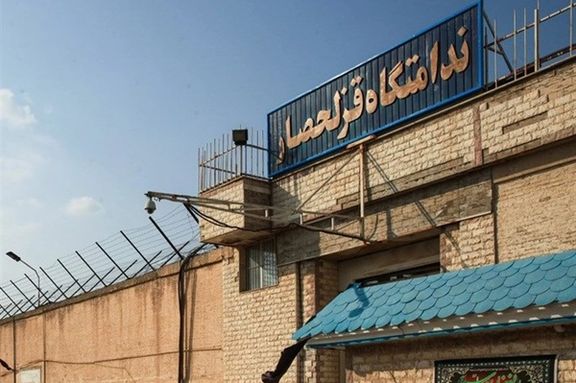
A protest gathering by families of drug crime convicts, who are sentenced to death, has turned violent with the intervention of prison guards in Karaj west of capital Tehran.
The US-based Human Rights Activists News Agency (HRANA) reported that the families of prisoners held a gathering in front of Ghezel-Hessar prison Wednesday, and some of them were injured when prison officers used violence.
Holding banners and handwritten placards, the families demanded a lesser punishment for those accused of drug crimes and a halt to carrying out their death sentences.
Families of death row prisoners have regularly held protests in the past months. They had previously gathered outside Iran's Judiciary headquarters in Tehran on January 14 and 16.
Based on reports by human rights organizations, a significant number of executions have been carried out in Iran are related to drug crimes.
So far, the total number of executions in 2022 has not been published, but the Oslo-based Iran Human Rights Organization previously announced 333 people had been executed in 2021; more than a third related to drug crimes.
The UN special rapporteur for human rights on Iran Javaid Rehman warned early September about the doubling of the number of executions in Iran in the first half of 2022 compared to the previous year. He described the number of death sentences "worrying", especially executions related to drug crimes.

A sociologist in Iran has characterised the Islamic Republic a “fundamental evil,” describing the nationwide uprising as “the revolution of good against evil.”
Iranian Academic Mostafa Mehraeen said at a gathering of sociologists that Iran is facing an implosion and a civilizational revolution because of the people’s experience in the years before and after the 1979 Islamic Revolution. He called on officials to think about why the Islamic Republic has been turned into a fundamental evil during the past four decades.
Many Iranian academics and commentators have become increasingly vocal in their criticism of the authoritarian regime, its mismanagement of the state and deadly violations of human rights in recent weeks.
Meanwhile, Mehraeen criticized some of his peers and firebrand cleric Ahmad Alamolhoda for saying that no one was killed by security forces during the uprising and that the movement in Iran was motivated by sex and alcohol. He said those who have made those false comments are “ignorant.” Mehraeein further accused Iran’s rulers of dishonesty and said: “They have been lying for 40 years.”
He added that claims by officials about the protest movement being a riot by gunmen was also a lie.
Mehraeen questioned the Islamic Republic for regarding itself as a "sacred order" and said, "Yes, you were sacred only in the first year after the revolution."
The sociologist can well put himself in danger of getting arrested, as dozens of journalists, artists and writers are currently in prison.
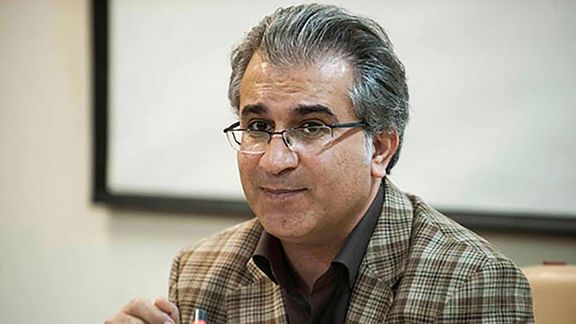
In another sharp remark, Mehraeein spoke about IRGC Commander Hossein Salami ordering Iranians "Not to take to the streets from tomorrow!" Mehraeein addressed Salami: "Do you own the nation? Do you own their bodies? Do you own the streets? Who are you and what is your status?"
He also recalled a move by members of the Islamic parliament who asked the hardliner Judiciary to execute detained protesters and said: "You foolish members of the parliament, you are supposed to be representing the people. What do you mean by saying that they should be executed?" He reminded the regime: "A political system is not all about the noose and hanging. It is not all about police, batons and repression!"
Mehraeein pointed out that one of the characteristics of the current protests is that they do not seek to disrupt the social order. "The protesters love their country and do not wish to start a civil war. That is why the conflict in restive provinces never turn into civil war because the ethnic people in those provinces seriously avoid any armed confrontation with the security forces. They want a revolution without bloodshed," he said.
During the past weeks, the Iranian Sociological Association has been holding several conferences to discuss the implications and the outlook of the Iranian protests that have been rocking the country for four months.
In his discussion about the pathology of civil protests, Iranian sociologist Ali Jafari separated the notion of culture from the idea of fabricated culture. For instance, when women reach a consensus on an issue such as hijab, that is culture, but ideological governments fabricate their own ideas as some kind of culture and try to impose that on the people. This is what we call fabricated culture, he said, which damages the society's cultural and social order.
The Association's website also featured an article by jailed sociologist Saeed Madani, written before the current protests, which argued that some social movements start without pre-planning or coordination.
Iranian sociologists had warned for years about the chances of protests similar to the Woman, Life Freedom movement, suddenly flaring up, but the regime never believed them. Even now when they have realized the predictive nature of sociological studies, they still keep academics such as Madani in jail and continue interrogating them and asking: How come you knew this and we didn't.